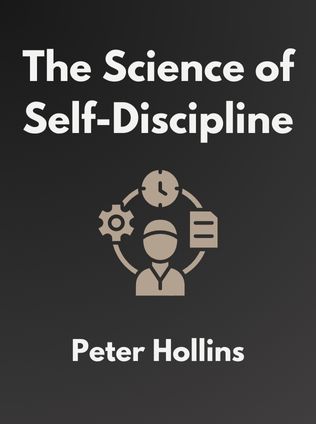
The Science of Self-Discipline
The Willpower, Mental Toughness, and Self-Control to Resist Temptation and Achieve Your Goals (Live a Disciplined Life Book 1)
By Peter Hollins
Published 10/2017
About the Author: Peter Hollins
Peter Hollins is a renowned psychology researcher and author, with a particular focus on self-improvement and the mechanisms behind human behavior. Over the years, Hollins has developed a reputation for distilling complex psychological concepts into practical advice that anyone can apply to their lives. His works, including The Science of Self-Discipline, Finish What You Start, and The Science of Self-Learning, are testaments to his ability to blend academic research with actionable strategies. Hollins's writing is deeply rooted in scientific research, yet it remains accessible and engaging for a wide audience. His approach to self-discipline is not merely about willpower; it’s about understanding the science behind our habits, emotions, and decisions, and using that knowledge to create lasting change.
Main Idea
The main idea of The Science of Self-Discipline is that discipline is not an innate trait but a skill that can be developed through consistent practice and understanding of the underlying psychological mechanisms. Hollins argues that self-discipline is essential for achieving long-term goals, as it enables individuals to resist short-term temptations in favor of long-term benefits. Unlike motivation, which is often fleeting and based on emotions, discipline is about building sustainable habits that carry you forward even when you don’t feel motivated. The book provides a comprehensive guide to developing discipline by addressing both the internal and external factors that influence our ability to stay focused and committed to our goals.
Table of Contents
- Introduction: The Importance of Self-Discipline
- Chapter 1: Understanding Self-Discipline
- Chapter 2: The Neuroscience of Discipline
- Chapter 3: The Role of Motivation
- Chapter 4: Developing Discipline Like a Muscle
- Chapter 5: Emotional Tools to Build Discipline
- Chapter 6: Logistical Tools to Build Discipline
- Chapter 7: Building an Environment That Supports Discipline
- Conclusion: The Long-Term Benefits of Discipline
Introduction: The Importance of Self-Discipline
Self-discipline is the foundation upon which all success is built. According to Hollins, without discipline, our goals remain dreams, unattainable and distant. He begins by highlighting the critical role discipline plays in achieving anything worthwhile. Hollins suggests that discipline is what bridges the gap between where we are and where we want to be. It’s the driving force that keeps us moving forward even when the journey is tough.
Hollins writes,
“Discipline is the willpower to resist things you desire in the short term in order to promote what’s best for you in the long term.”This quote encapsulates the essence of his argument: that discipline is about making decisions that benefit your future self, even when they are uncomfortable in the present.
Sign up for FREE and get access to 1,400+ books summaries.
You May Also Like
The Subtle Art of Not Giving a F*ck
A Counterintuitive Approach to Living a Good Life
By Mark MansonRich Dad Poor Dad
What the Rich Teach Their Kids About Money - That the Poor and Middle Class Do Not!
By Robert T. KiyosakiHow To Win Friends and Influence People
The All-Time Classic Manual Of People Skills
By Dale CarnegieFreakonomics
A Rogue Economist Explores the Hidden Side of Everything
By Steven D. Levitt and Stephen J. Dubner



















